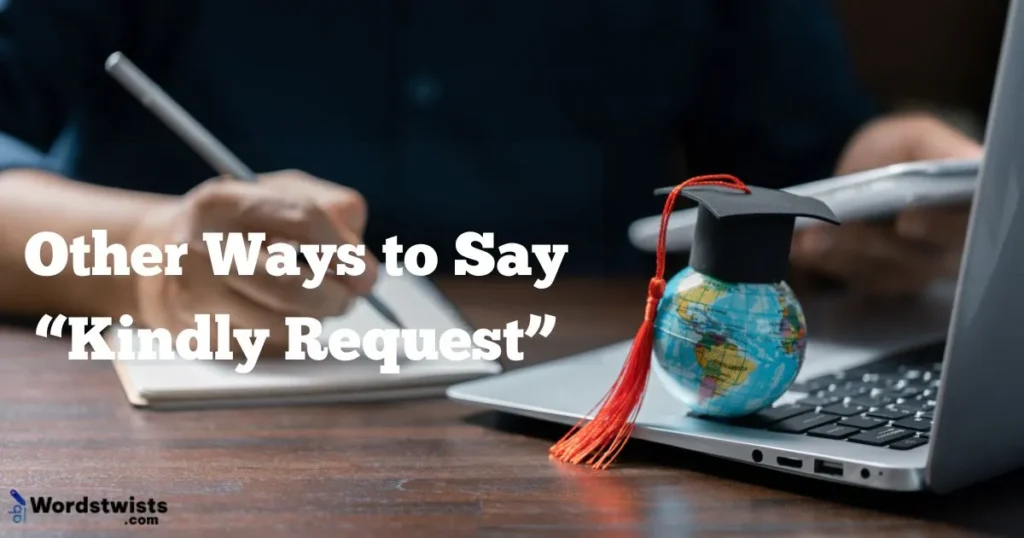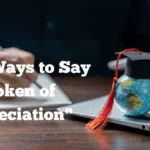We all know how important it is to sound polite and respectful, especially when asking someone for something. The phrase “kindly request” is often used in emails, letters, or conversations to soften a demand or favor. But if you use it too much, it can start to feel repetitive or even a little stiff.
That’s why I’ve put together 25 warm and professional alternatives to “kindly request” that will help you sound more natural, varied, and friendly in your communication. These phrases are perfect whether you’re writing business emails, chatting with colleagues, or making polite asks in everyday life.
Using these alternatives will not only improve your tone but also make your messages stand out with a personal touch and clear respectful language. Let’s dive into this helpful list so you can express your requests with style and confidence!
Alternatives to “Kindly Request”
1. Would appreciate
Use this when you want to politely show that you value someone’s help or action.
Usage Examples:
- I would appreciate your feedback on the report.
- We would appreciate it if you could reply by Friday.
- I would appreciate your help with this project.
- Your prompt response would be appreciated.
- I would appreciate it if you could send the documents soon.
Why it works:
It’s polite, simple, and shows gratitude in advance, making your request feel warm and sincere.
2. Would be grateful
This phrase expresses appreciation and politeness when making a request.
Usage Examples:
- I would be grateful if you could review my application.
- We would be grateful for your assistance in this matter.
- I would be grateful if you could provide more information.
- Your help would be greatly appreciated.
- I would be grateful for your prompt attention.
Why it works:
Shows humility and respect, making it great for formal requests.
3. Please
A straightforward, polite word to make a request sound respectful.
Usage Examples:
- Please send me the updated schedule.
- Please let me know if you have any questions.
- Please review the attached document.
- Please confirm your attendance.
- Please provide your feedback by Monday.
Why it works:
Simple and universally polite, it works in both formal and informal settings.
4. I would like to ask
Use this when you want to clearly and politely express your request.
Usage Examples:
- I would like to ask if you could join the meeting.
- I would like to ask for your support on this issue.
- I would like to ask if you can send the report.
- I would like to ask your opinion on this matter.
- I would like to ask if you are available next week.
Why it works:
It’s clear, respectful, and shows you’re politely reaching out.
5. I’m reaching out to ask
This is a friendly, conversational way to start a request, especially in emails.
Usage Examples:
- I’m reaching out to ask if you could assist with the project.
- I’m reaching out to ask for your advice.
- I’m reaching out to ask if you have time for a quick call.
- I’m reaching out to ask about the status of my application.
- I’m reaching out to ask if you could review the proposal.
Why it works:
Feels personal and warm, great for building connection while making a polite ask.
6. I hope you can
Use this to express your request with genuine hope and positive tone.
Usage Examples:
- I hope you can join us for the meeting.
- I hope you can review the document today.
- I hope you can help me resolve this issue.
- I hope you can take a look when you have a moment.
- I hope you can send over the final version soon.
Why it works:
It’s soft, human, and non-demanding—great for polite communication that feels personal.
7. May I ask
This is a very respectful and gentle way to begin a request, especially in formal settings.
Usage Examples:
- May I ask you to sign this form?
- May I ask for your opinion on this matter?
- May I ask if you have a few minutes to talk?
- May I ask for your assistance with this file?
- May I ask whether the meeting is still on?
Why it works:
It shows politeness and humility, making it suitable for sensitive or formal situations.
8. Could you please
This is a classic polite phrase used in both professional and everyday requests.
Usage Examples:
- Could you please share the updated file?
- Could you please confirm your availability?
- Could you please explain that again?
- Could you please check the numbers for me?
- Could you please help me with this task?
Why it works:
It’s polite, easy to understand, and commonly accepted as a soft way to ask.
9. I’d be thankful if
Use this phrase to express gratitude in advance while making a polite ask.
Usage Examples:
- I’d be thankful if you could send it today.
- I’d be thankful if you could clarify this part.
- I’d be thankful if you could lend a hand.
- I’d be thankful if you replied by tomorrow.
- I’d be thankful if you kept me updated.
Why it works:
It adds warmth and appreciation, which builds good rapport.
10. I’d be obliged if
A more formal alternative, often used in professional emails or letters.
Usage Examples:
- I’d be obliged if you could provide the details.
- I’d be obliged if you could get back to me soon.
- I’d be obliged if you forwarded this to your team.
- I’d be obliged if you could offer your feedback.
- I’d be obliged if you considered my application.
Why it works:
It’s polite and respectful, perfect for formal workplace communication or official writing.
11. Would you mind
Use this when you want to be extra careful not to sound demanding.
Usage Examples:
- Would you mind sending the update?
- Would you mind reviewing this section?
- Would you mind helping me understand this better?
- Would you mind if I ask a quick question?
- Would you mind checking the details again?
Why it works:
It invites the listener’s permission, making the request feel gentle and considerate.
12. I’m writing to ask
Perfect for email intros when you want to sound respectful and to the point.
Usage Examples:
- I’m writing to ask for your approval.
- I’m writing to ask if you can attend the session.
- I’m writing to ask about the final decision.
- I’m writing to ask whether you’ve reviewed the file.
- I’m writing to ask for your opinion on the proposal.
Why it works:
Professional and direct—great for email or formal messages.
13. If you could
This is a soft, subtle way to make a request without sounding pushy.
Usage Examples:
- If you could let me know by noon, that’d be great.
- If you could review the slides before the meeting, I’d appreciate it.
- If you could send the file by EOD, that would help.
- If you could confirm, we can finalize the details.
- If you could assist with this, I’d be grateful.
Why it works:
It’s casual yet polite—adds flexibility and respectful tone to your ask.
14. It would be great if
Use this when you want to sound friendly and team-spirited.
Usage Examples:
- It would be great if you could join us.
- It would be great if you shared your ideas.
- It would be great if you looked this over.
- It would be great if we had your input.
- It would be great if you finalized the report today.
Why it works:
This keeps the tone light and collaborative, which people respond well to.
15. I’d like to kindly ask
A softer, more polite version of “I request,” with a kind tone.
Usage Examples:
- I’d like to kindly ask for your review.
- I’d like to kindly ask you to update the file.
- I’d like to kindly ask about the project timeline.
- I’d like to kindly ask if you need any help.
- I’d like to kindly ask you to double-check the figures.
Why it works:
Blends respect and warmth, keeping the communication human and sincere.
Read Synonym: Other Ways to Say “Take Your Time”
16. May I kindly ask
A very polite and formal way to request something, often used in customer service or official messages.
Usage Examples:
- May I kindly ask you to review the attached file?
- May I kindly ask for your confirmation by Friday?
- May I kindly ask for your cooperation on this matter?
- May I kindly ask you to share your availability?
- May I kindly ask for a quick update on the status?
Why it works:
This phrase is ideal for situations where you want to show extra respect and courtesy, especially in formal emails or sensitive topics.
17. Please be so kind as to
This is an elegant, old-fashioned phrase that sounds highly respectful.
Usage Examples:
- Please be so kind as to complete the form.
- Please be so kind as to respond at your earliest convenience.
- Please be so kind as to check the details below.
- Please be so kind as to notify us of your decision.
- Please be so kind as to forward this message to the correct department.
Why it works:
It conveys genuine humility and formality, perfect for requests where etiquette matters.
18. Would you be so kind as to
Similar to the above, but slightly more modern and conversational.
Usage Examples:
- Would you be so kind as to share your feedback?
- Would you be so kind as to assist with the final edits?
- Would you be so kind as to send the invoice today?
- Would you be so kind as to help me clarify this section?
- Would you be so kind as to check your calendar for availability?
Why it works:
It maintains a respectful tone while feeling less outdated—good for professional or formal asks.
19. I humbly ask
Use this when you want to express a sincere and respectful tone, especially in formal letters or sensitive topics.
Usage Examples:
- I humbly ask for your support in this project.
- I humbly ask you to consider my request.
- I humbly ask for your patience as we resolve the issue.
- I humbly ask that you review my application.
- I humbly ask you to help us move forward.
Why it works:
It adds a tone of genuine humility, which builds trust and empathy with the reader.
20. I’d like to request
A clear and professional way to make a direct yet polite request.
Usage Examples:
- I’d like to request your input on this design.
- I’d like to request a meeting for next week.
- I’d like to request additional time to complete the task.
- I’d like to request your assistance in resolving the issue.
- I’d like to request a copy of the agreement.
Why it works:
It’s professional, straightforward, and commonly used in business communication and formal writing.
21. I seek your assistance in
This phrase is especially useful when asking for help with something specific and important.
Usage Examples:
- I seek your assistance in reviewing this contract.
- I seek your assistance in managing this request.
- I seek your assistance in resolving this matter quickly.
- I seek your assistance in gathering feedback.
- I seek your assistance in coordinating with the vendor.
Why it works:
It positions your ask as a collaborative effort, which can be more persuasive and respectful.
22. I’d appreciate it if
This phrase combines gratitude and politeness, creating a soft yet clear request.
Usage Examples:
- I’d appreciate it if you could send the files by noon.
- I’d appreciate it if you could check the schedule.
- I’d appreciate it if you responded today.
- I’d appreciate it if you gave this some thought.
- I’d appreciate it if you reviewed the attached summary.
Why it works:
It sounds grateful without sounding needy—perfect for emails, texts, and workplace messages.
23. I kindly invite you to
Use this when you’re inviting someone to take action, especially in event or group communication.
Usage Examples:
- I kindly invite you to attend our upcoming webinar.
- I kindly invite you to share your feedback.
- I kindly invite you to connect with our team.
- I kindly invite you to review the attached notes.
- I kindly invite you to participate in our survey.
Why it works:
This turns a request into an opportunity, which can be more appealing to the reader.
24. I’m hoping you can
This phrase is friendly and approachable, making it great for casual professional messages.
Usage Examples:
- I’m hoping you can send the update today.
- I’m hoping you can help me with this draft.
- I’m hoping you can jump on a quick call.
- I’m hoping you can check this before noon.
- I’m hoping you can join the meeting tomorrow.
Why it works:
It adds a light tone while still expressing trust and positive expectation.
25. I respectfully request
A strong yet polite phrase for formal or official writing, especially legal, academic, or professional settings.
Usage Examples:
- I respectfully request a review of the attached proposal.
- I respectfully request an extension on the deadline.
- I respectfully request your opinion on this matter.
- I respectfully request that this issue be prioritized.
- I respectfully request clarification regarding this section.
Why it works:
It balances authority and humility, ideal for high-stakes or sensitive communication.
Conclusion
I hope you found these 25 polite alternatives to “kindly request” useful and easy to apply in your everyday communication. Whether you’re writing a professional email, a formal request, or just reaching out to someone respectfully, these phrases help you sound natural, confident, and thoughtful.
I personally use many of these alternatives in my own work, especially when I want to keep my tone warm and human without sounding robotic or repetitive. Feel free to bookmark this list or refer back whenever you feel stuck searching for the right tone.
Let your words reflect your courtesy, not just your intent—and your messages will always be received with kindness.

I’m Leo Knox, the wordplay wizard behind WordsTwists.com where I turn everyday meanings into funny, clever, and creative twists. If you’re tired of saying things the boring way, I’ve got a better (and funnier) one for you!


